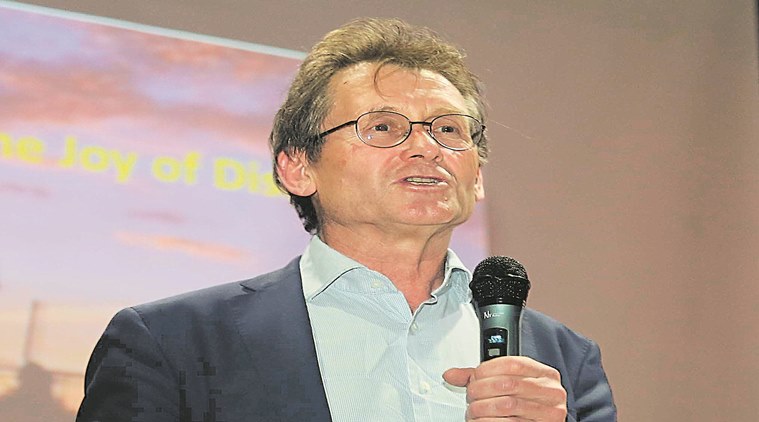
How did you get into this field?
I think it started in the high school, when I had a very good chemistry and physics teacher who stimulated me a lot. Then I went to the university and there too I had a very good professor. It helps a lot when you have stimulating teachers.
Did you expect a Nobel Prize or it came as a surprise for you?
It was a very big surprise for me. I did not even think about it. I was busy with teaching and my research so I was not thinking about getting a Nobel Prize. I was a bit in shock when I first heard about getting a Nobel Prize. This was so unexpected for me. It was like a dream for me.
What should be done to encourage pure sciences?
First of all, we should be encouraging at university level to do basic science. We should also look at potential for society and industry, but most important is that universities have a good basis in fundamental sciences because we have to train the students for the future and think about new knowledge, new discoveries and to do that it can be long-term and a lot of things you cannot predict because you try to do new insights and discoveries but can be completely different because you can do unexpected discoveries and these are more often the beautiful ones and can make a dramatic impact. It is very important that we have a very strong base of fundamental science. We should train our students to distinguish facts from fiction and what data and information means.
How can we boost research in chemistry in India?
I think India has so much talent. I would say that government should invest a bit more in science and that is very important that you have a really good funding for science, technology and innovation. That will bring India forward and it’s needed because there are many questions about clean water, new drugs, fighting diseases, about energy and fuel in the future and how to recycle material. There are lots of challenges. These are important questions and of course there will be a lot of basic science and technology needed to make that advance happen.
How can young children be inculcated with love for chemistry?
I am a chemist. For chemistry and physics, there are a lot of experiments and I think young children, even in elementary schools, like discoveries. They like to experiment. So, I think we should encourage doing experiments and discoveries. Children are extremely creative, they are not spoiled and they think with a very open mind. I think we should encourage them to do experiments and discoveries. Learning by discovery is really important. Then when they go to high school, they can do all kinds of chemical experiments. They get really enthusiastic about chemistry. Of course, they have to learn the theory but it becomes much more interesting when you can also show them how you can make things, change things like how you can make a nice colour or crystal. All these things are important and I think children love that.
In general, there are a few women in the field of pure science. What should be done to encourage them?
I see already so many talented women students here in colleges and universities. I am really proud to see how well they are doing and I think you should also be proud of them. But we can encourage them more that they should not be afraid because there still an element that physics, chemistry and mathematics is for man but this is nonsense because we see that so many girls who do outstanding work even in my own lab. They are very creative, they work very hard and they are very good at experimentation. We need to encourage more women to go into sciences.
What is the relevance of chemistry in the age of artificial intelligence?
I am not really into artificial intelligence but you can see, with computer-based systems and artificial intelligence you can make systems that learn themselves. So a lot of future discoveries will happen. So you might engage with automated systems, robotics systems and they can learn from experiments and you can take advantage of artificial intelligence. You see this already. Nowadays people use artificial intelligence to design experiments and then they will automatically optimise experiments using methods of artificial intelligence. So I think there will be a lot of influence, it will help to speed up discoveries.
Which are the chemical reactions that take place all around us even as we talk?
There are a lot of biochemical reactions in your body etc. Human body is all about molecular processes. The fact that we can move our arms or we can speak and digest the food, this is a big chemical machinery in your cells that makes this possible.
How did your life change after getting the Nobel Prize?
Oh! I get lots of requests and invitations from everywhere because they want you to lecture and talk about science. I go to schools to advocate the importance of science and education. I have to say no quite often, but I too enjoy teaching. Nobel Prize is a big honour and I see it as my duty to tell society, teachers, students why education and science is so important.